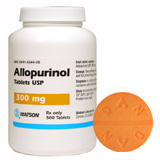Allopurinol Pet Medication

- Dog
- Availability: Prescription
- Active Ingredient(s):
- What is Allopurinol used for?
Allopurinol helps to prevent the formation of bladder stones in dogs by inhibiting the production of uric acid.
- How Allopurinol should be used?
Allopurinol is not FDA approved for use in veterinary medicine; however, it is a commonly accepted practice for veterinarians to use this medication in dogs. The usual starting dose in dogs is 5mg/pound given with food once a day. Since the patient will most probably be on this medication for life, urine excretion tests to measure the effective dose of this medication should be done at least yearly. Allopurinol may be used in conjunction with specialty foods also used to control the formation of bladder stones.
- What are the side effects?
Side effects when using allopurinol are not common; however, they can include vomiting and diarrhea, anemia as a result of bone marrow suppression, blood in the urine, skin rash and liver damage. Allergic reactions such as facial swelling or hives are also rare but can occur.
- What special precautions are there?
Allopurinol should not be used in patients allergic to this medication. Use with caution in patients with kidney or liver disease. Do not use in pregnant or lactating animals. Do not use in puppies or kittens. Certain prescription medications should be used with caution when given with allopurinol. These include Allopurinol should not be used in patients allergic to this medication. Use with caution in patients with kidney or liver disease. Do not use in pregnant or lactating animals. Do not use in puppies or kittens. Certain prescription medications should be used with caution when given with allopurinol. These include: amoxicillin and ampicillin due to an increased risk of skin rash; cyclophosphamide which may cause an increased risk of bone marrow suppression; anticoagulants such as warfarin because of increased risk of bleeding; loop diuretics such as furosemide which may decrease the effectiveness of allopurinol, and probenecid which may increase the effectiveness of allopurinol. Always tell your veterinarian and pharmacist what other medications your pet is taking.
- In the event of overdose?
Contact your veterinarian or veterinary emergency room.
- How should I store Allopurinol?
Keep this medication in the container it came in, tightly closed. Store tablets at room temperature, away from excess heat, light and moisture. Do not store in the bathroom. Throw away any medication that is outdated or no longer needed. Keep out of reach of children and pets.
Disclaimer: The information on this site is for educational purposes only and should NOT be considered veterinary advice. Any veterinary questions should be referred to your veterinarian. This information is NOT to be used for diagnosis or treatment of your pet. Please make your own inquiries with your veterinarian for the suitability of a product for your pet.




